
Luis Buñuel Portolés was a Spanish-Mexican filmmaker who worked in France, Mexico, and Spain. He has been widely considered by many film critics, historians, and directors to be one of the greatest and most influential filmmakers of all time.

L'Age d'Or, commonly translated as The Golden Age or Age of Gold, is a 1930 French surrealist satirical comedy film directed by Luis Buñuel about the insanities of modern life, the hypocrisy of the sexual mores of bourgeois society, and the value system of the Catholic Church. Much of the story is told with title cards like a predominantly silent film. The screenplay is by Buñuel and Salvador Dalí. L'Age d'Or was one of the first sound films made in France, along with Miss Europe and Under the Roofs of Paris.

The Discreet Charm of the Bourgeoisie is a 1972 surrealist film directed by Luis Buñuel from a screenplay co-written with Jean-Claude Carrière. The narrative concerns a group of bourgeois people attempting—despite continual interruptions—to dine together. The French-language film stars Fernando Rey, Stéphane Audran, Jean-Pierre Cassel, Paul Frankeur, Delphine Seyrig, Bulle Ogier, Julien Bertheau, and Milena Vukotic.

Michael O'Donoghue was an American writer and performer. He was known for his dark and destructive style of comedy and humor, was a major contributor to National Lampoon magazine, and was the first head writer of Saturday Night Live. He was also the first performer to utter a line on that series.
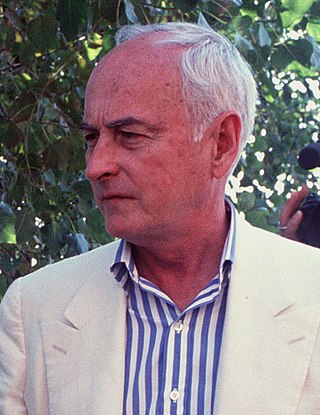
James Francis Ivory is an American film director, producer, and screenwriter. For many years, he worked extensively with Indian-born film producer Ismail Merchant, his domestic as well as professional partner, and with screenwriter Ruth Prawer Jhabvala. All three were principals in Merchant Ivory Productions, whose films have won seven Academy Awards; Ivory himself has been nominated for four Oscars, winning one.

Burke & Wills is a 1985 Australian adventure film directed by Graeme Clifford, starring Jack Thompson and Nigel Havers. The film is based on the ill-fated Burke and Wills expedition across Australia.
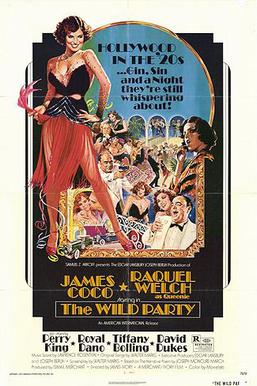
The Wild Party is a 1975 American comedy-drama film directed by James Ivory and produced by Ismail Merchant for Merchant Ivory Productions. Loosely based on Joseph Moncure March's narrative poem of the same name, the screenplay is written by Walter Marks, who also composed the score. The plot follows an aging silent movie comic star of the 1920s named Jolly Grimm attempts a comeback by staging a party to show his new film.
George William Swift Trow, Jr. was an American essayist, novelist, playwright, and media critic. He worked for The New Yorker for almost 30 years, and wrote numerous essays and several books. He is best known for his long essay on television and its effect on American culture, "Within the Context of No Context," first published in The New Yorker on November 17, 1980, one of the few times the magazine devoted its central section to a single piece of writing.

Jefferson in Paris is a 1995 historical drama film, directed by James Ivory, and previously entitled Head and Heart. The screenplay, by Ruth Prawer Jhabvala, is a semi-fictional account of Thomas Jefferson's tenure as the Ambassador of the United States to France before his presidency and of his alleged relationships with British artist Maria Cosway and his slave, Sally Hemings.
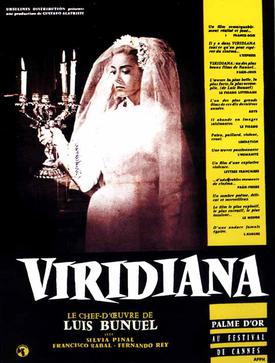
Viridiana is a 1961 Spanish-Mexican film directed by Luis Buñuel and produced by Gustavo Alatriste. It is loosely based on the 1895 novel Halma by Benito Pérez Galdós.

The Exterminating Angel is a 1962 Mexican surrealist film written and directed by Luis Buñuel, starring Silvia Pinal, and produced by Pinal's then-husband Gustavo Alatriste. It tells the story of a group of wealthy guests who find themselves unable to leave after a lavish dinner party, and the chaos that ensues. Sharply satirical and allegorical, the film contains a depiction of the aristocracy that suggests they "harbor savage instincts and unspeakable secrets".

Heights is a 2005 Merchant Ivory Productions film that follows a pivotal twenty-four hours in the interconnected lives of five New Yorkers. It stars Elizabeth Banks as Isabel, a photographer, James Marsden as Jonathan, a Jewish lawyer and Isabel's fiancé, Glenn Close as Diana, Isabel's mother, Jesse Bradford as Alec, an actor, and John Light as Peter, a journalist. Numerous prominent actors such as Eric Bogosian, George Segal, and Isabella Rossellini appear in supporting roles.
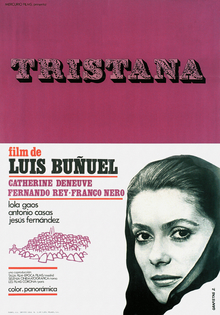
Tristana is a 1970 drama film directed and produced by Luis Buñuel, and starring Catherine Deneuve, Fernando Rey, and Franco Nero. The screenplay by Buñuel and Julio Alejandro adapts an 1892 realist novel of the same name by Benito Pérez Galdós. It is a Spanish-French-Italian co-production filmed in Toledo, Buñuel's one-time home, and represents his return to his native country after several years living and working abroad. It earned positive acclaim from critics, and was nominated for Best Foreign-Language Film at the 43rd Academy Awards.
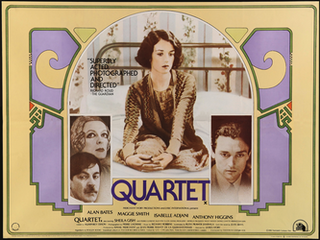
Quartet is a 1981 Merchant Ivory film starring Maggie Smith, Isabelle Adjani, Anthony Higgins and Alan Bates, set in 1927 Paris. It premiered at the 1981 Cannes Film Festival, and was an entry for the Sélection Officielle. It was adapted from the novel of the same name by Jean Rhys.

The Golden Bowl is a 2000 period romantic drama film directed by James Ivory. The screenplay by Ruth Prawer Jhabvala is based on the 1904 novel of the same name by Henry James, who considered the work his masterpiece. It stars Kate Beckinsale, James Fox, Anjelica Huston, Nick Nolte, Jeremy Northam, Madeleine Potter, and Uma Thurman.
Donald Rosenfeld was the President of Merchant Ivory Productions from 1986 through 1998. Rosenfeld was the lead Producer on the major Merchant Ivory films created in what is now considered their Golden Decade. Along with Ismail Merchant, James Ivory and Ruth Prawer Jhabvala, Rosenfeld worked on the creation of the cinematic masterpieces Mr. & Mrs. Bridge, Howards End, and The Remains of the Day, among others. Rosenfeld was the youngest producer ever to become a member of the Academy of Motion Picture Arts and Sciences in 1992.

Heat and Dust is a 1983 British historical romantic drama film, with a screenplay by Ruth Prawer Jhabvala based on her novel, Heat and Dust (1975). It was directed by James Ivory and produced by Ismail Merchant. It stars Greta Scacchi, Shashi Kapoor and Julie Christie.

Behind the Candelabra is a 2013 American biographical drama film directed by Steven Soderbergh. It dramatizes the last ten years in the life of pianist Liberace and the relationship that he had with Scott Thorson. It is based on Thorson's memoir, Behind the Candelabra: My Life with Liberace (1988). Richard LaGravenese wrote the screenplay. Jerry Weintraub was the executive producer.

Wild Tales is a 2014 Spanish-language black comedy anthology film that was written and directed by the Argentine filmmaker Damián Szifron. The film, which is a co-production between Argentina and Spain, is composed of six standalone shorts with a common theme of catharsis, violence and vengeance. The film has an ensemble cast consisting of Ricardo Darín, Oscar Martínez, Leonardo Sbaraglia, Érica Rivas, Rita Cortese, Julieta Zylberberg, and Darío Grandinetti. Because of Szifron's desire to work with Darín and Martínez, these actors were allowed to choose the role they wanted.

How to Talk to Girls at Parties is a 2017 science fiction romantic comedy film directed by John Cameron Mitchell and written by Philippa Goslett and Cameron Mitchell, based on the 2006 short story of the same name by Neil Gaiman. The film stars Elle Fanning, Alex Sharp, Nicole Kidman, Ruth Wilson and Matt Lucas. Principal photography began on 9 November 2015, in Sheffield.



















